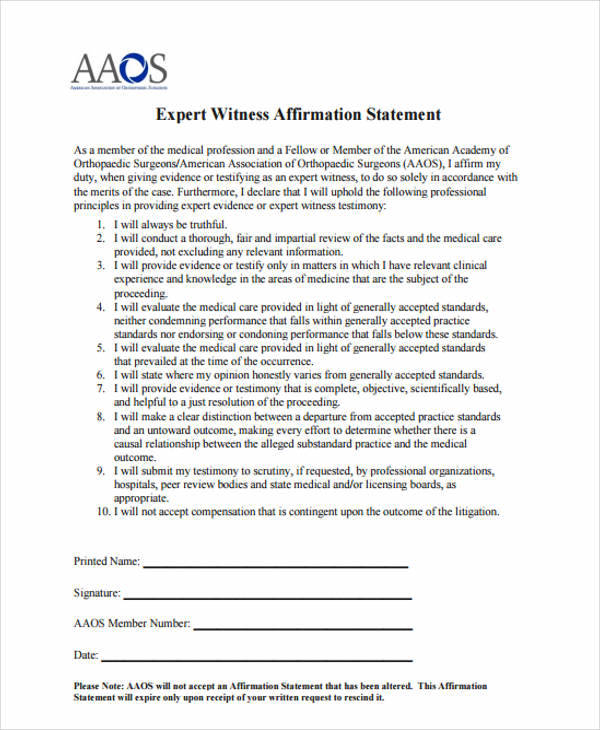

The duties and responsibilities of expert witnesses outlined above in Schneider, were also endorsed by the Supreme Court of Appeal ( SCA) in its judgment in PricewaterhouseCoopers Incorporated and others v National Potato Co-operative Ltd and another ( PricewaterhouseCoopers). In cases where an expert witness who has prepared a report could not assert that the report contained the truth, the whole truth and nothing but the truth without some qualification, that qualification should be stated in the report.’ If an expert opinion is not properly researched because he considers that insufficient data is available, then this must be stated with an indication that the opinion is no more than a provisional one.An expert witness should make it clear when a particular question or issue falls outside his expertise.He should not omit to consider material facts which could detract from his concluded opinion. An expert witness should state the facts or assumptions upon which his opinion is based.An expert witness should never assume the role of an advocate. An expert witness should provide independent assistance to the court by way of objective, unbiased opinion in relation to matters within his expertise ….Schneider NO and Others v AA and Another ( Schneider), the court – per Davis J – also referred to the well-known South African textbook on the law of evidence (Zeffertt, Paizes & Skeen The South African Law of Evidence at 330), where the learned authors thereof, citing the English judgment of National Justice Compania Naviera SA v Prudential Assurance Co Ltd (The ‘Ikarian Reefer’), outlined the duties of an expert witness as follows:Įxpert evidence presented to the court should be, and should be seen to be, the independent product of the expert uninfluenced as to form or content by the exigencies of litigation. In the case from which the above-quoted passage is taken, i.e. An expert does not assume the role of an advocate, nor gives evidence which goes beyond the logic which is dictated by the scientific knowledge which that expert claims to possess.’ ‘An expert is not a hired gun who dispenses his or her expertise for the purposes of a particular case. However, a cautionary note must be sounded, namely that: This happens because the party requires the opinion of a skilled witness to support a particular contention, or, perhaps, a certain line of reasoning from which justifiable inferences may properly be drawn by the witness in an objective and unbiased manner. In litigious proceedings an expert witness will be called by one of the parties involved in such proceedings. The meanings of the words “ summary” and “ opinions” are reasonably clear.’ If a party intends calling a witness to give expert evidence of the kind discussed above, he is required to furnish the other party with “ a summary” of such witness’s “ opinions and his reasons therefor”. For an example of evidence held to be admissible because it “ could be of great assistance to the court” in drawing the inference it was required to draw, see R v Vilbro and Another, 1957 (3) SA 223 (AD) at p. There are some subjects upon which the court is usually quite incapable of forming an opinion unassisted, and others upon which it could come to some sort of independent conclusion, but the help of an expert would be useful (see, Hoffman, S.A. ‘… by reason of their special knowledge and skill, they are better qualified to draw inferences than the trier of fact. the true and practical test for the admissibility or receivability of an expert’s opinion is whether or not the court:.

His own decision should not, however, displace that of the tribunal which has to determine the issue to be tried …’ and the prime function of an expert witness is ‘… to guide the court to a correct decision on questions falling within his specialised field.Various facets of the above formulation of what an expert witness is, have been reiterated or emphasised in many different ways in judicial pronouncements made over the years. The expression ‘ expert witness’ is ordinarily used to refer to a witness whose opinions, and the reasons on which they are based, are admissible in evidence in litigious matters, as his or her knowledge and experience in some or other subject matter or in a particular field, usually technical or scientific in nature, enables such a witness to draw inferences and form views in circumstances where a court or tribunal is unable to do so reliably, unless it receives assistance or guidance from someone with expertise on the relevant subject matter or in that particular field. WHAT DOES THE EXPRESSION ‘ EXPERT WITNESS’ MEAN? THE ROLE OF AN EXPERT WITNESS AND THE EVALUATION OF EXPERT EVIDENCE


 0 kommentar(er)
0 kommentar(er)
